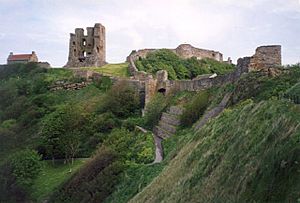James Berry (major-general) facts for kids
Quick facts for kids
James Berry
|
|
|---|---|

Scarborough Castle, where Berry was imprisoned from 1660 until his release in 1672
|
|
| Member of Parliament for Worcestershire |
|
| In office September 1656 – February 1658 |
|
| Rule of the Major-Generals, responsible for Herefordshire, Worcestershire, Shropshire and Wales | |
| In office November 1655 – January 1657 |
|
| Personal details | |
| Born | Unknown Uncertain |
| Died | 9 May 1691 Stoke Newington |
| Nationality | English |
| Spouse | Mary Berry (died 1681) |
| Military service | |
| Rank | Major General |
| Battles/wars | |
James Berry (died 9 May 1691) was an English clerk who became a Major General in the Parliamentarian army during the Wars of the Three Kingdoms. These wars were a series of conflicts in the mid-1600s across England, Scotland, and Ireland. Berry was a close friend of Oliver Cromwell, a powerful leader of the Parliamentarian forces.
From 1655 to 1657, Berry was in charge of a large area of England and Wales, including Herefordshire, Worcestershire, Shropshire, and all of Wales. He was known for being kind to religious groups like the Fifth Monarchists and Quakers. These groups had different ideas about how society should be run.
Because of his views, James Berry was seen as unreliable by George Monck. Monck was a key figure in bringing the king back to power in 1660, an event known as the Stuart Restoration. Berry was arrested in 1660 and held in Scarborough Castle until 1672. After his release, he became a gardener in Stoke Newington, where he passed away in 1691.
Early Life and Family
We don't know much about James Berry's early life. By the 1630s, he worked as a clerk at an Ironworks in the West Midlands of England. He lived in Stourbridge with Richard Baxter, a Presbyterian church leader. Berry helped Baxter get a job as a schoolmaster in Dudley. He also attended Baxter's ordination in 1638, which is a ceremony where someone becomes a minister.
At some point before 1650, James Berry married Mary Berry. She died in 1681. It's not known if they had any children.
Fighting in the English Civil War
When the First English Civil War started in August 1642, James Berry joined the Parliamentarian army. He became a Captain Lieutenant in a cavalry (horse-riding soldiers) regiment led by Oliver Cromwell. This unit later became famous as the "Ironsides." In 1643, they joined the Army of the Eastern Association, led by the Earl of Manchester. Many officers from this group, including Berry, went on to hold important positions later.
Berry's first big battle was at Gainsborough in July 1643. He was said to have killed the Royalist commander, Charles Cavendish. During this time, Berry became an Independent, a type of Protestant who believed churches should be self-governing. His friend Baxter, who was a more moderate Presbyterian, didn't want to be a chaplain (a religious leader) for the Ironsides. He reportedly disliked their strong religious views. Baxter later called Berry "one of Cromwell's favourites."
Berry continued to fight alongside Cromwell for the next year and a half. He fought in important battles like Winceby, Lincoln, Marston Moor, and Second Newbury. In April 1645, the New Model Army was formed. This was a professional, well-trained army created by Parliament. Berry and his soldiers joined Sir Thomas Fairfax's regiment. They fought at Naseby, Langport, and helped capture Bristol in September 1645.
Now a major (a higher military rank), Berry took part in the Battle of Torrington in February 1646. This was the last major battle of the war in the West Country. His regiment then joined the Siege of Oxford. Soon after, King Charles I surrendered to the Scottish Covenanter army in May 1646. The king ordered all his remaining forces to give up, and Oxford surrendered in June.
Second English Civil War and Beyond
After the first war, there were big disagreements between the New Model Army and most of the MPs in Parliament. These disagreements also affected the army itself. In August 1647, Berry was moved to a different regiment led by Colonel Philip Twisleton. This happened because the Army Council (the army's leaders) thought the previous commander was not politically reliable.
In April 1648, the Scots joined with English Royalists and unhappy Parliamentarians to try and bring King Charles I back to power. This led to the Second English Civil War. Berry fought with the forces sent north to deal with the invading Scottish army and their English allies. He fought at the Battle of Preston in August, which was a big victory that ended serious Royalist resistance. Berry was chosen to deliver the news of this victory to Parliament.
Soon after, he was sent to Scotland, which the New Model Army occupied for several months. Because he was in Scotland, Berry missed the events that led to the Execution of Charles I in January 1649. After the king's execution, England became a republic called the Commonwealth of England.
In October 1659, the Rump Parliament (a part of Parliament that was brought back) took away Berry's military rank and duties, along with those of other officers.
 | Anna J. Cooper |
 | Mary McLeod Bethune |
 | Lillie Mae Bradford |

